Archive
New Evidence on Who Wrote the Bible, and When
The world’s most popular piece of writing may have been written earlier than many people think. And it may have been more widely read.
In 2004, I suggested that the Israelites promoted widespread literacy early in the first millennium BCE, in part or perhaps primarily to help spread Scripture. My analysis, which appears in my NYU Press publication In the Beginning: A Short History of the Hebrew Language, is based largely on theoretical considerations like the ancient Israelites’ contributions to writing.
In 2007, the excellent scholar Karel van der Toorn published a competing theory in his Scribal Culture and the Making of the Hebrew Bible. He represents the more mainsteam view that literacy was limited to a very small scribal class. In my review of his work for the Jerusalem Post (apparently no longer available on line), I noted that:
Vexingly, then, we are left with two largely incompatible conclusions [van der Toorn’s and mine], each internally consistent and coherent, but unlikely both to be entirely correct. Puzzles such as these create exciting times for scholarship…
In an article just published in PNAS (Proceedings of the National Academy of Sciences of the United States of America) — available on line here for a fee and summarized here by the New York Times — an interdisciplinary team that includes mathematicians, archaeologists, and historians concludes that literacy was widespread in the Kingdom of Judah as early as 600BCE.
Their evidence comes from 16 inscriptions from Arad, an ancient military outpost south of Jerusalem. The style of the letters in the inscriptions points to at least six different ancient literate writers. The content of the inscriptions suggests that even low-ranking officials wrote things for themselves.
In fact, the authors identify five rungs of hierarchy represented by the inscriptions, starting with the king of Judah and running through a high-ranking commander, a local commander in Arad, and a quartermaster in Arad named Eliashib down to Eliashib’s subordinate. Even that subordinate, apparently, was literate.
The authors conclude that literacy in Judah was widespread far earlier than scholars like van der Toorn have thought.
Combined with my largely theoretical evidence in In the Beginning, we now have even more reason to believe that parts of the written text of the Bible date to the early first millennium BCE.
Additionally, it seems that widespread literacy was an integral part of the ancient Judaean agenda, alongside other more widely noted goals such as monotheism.
“The Bible Doesn’t Say That” Goes On-Sale Today!
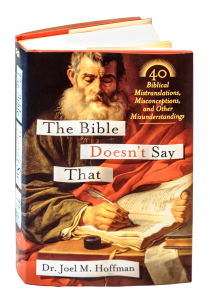 My latest book — The Bible Doesn’t Say That: 40 Biblical Mistranslations, Misconceptions, and Other Misunderstandings — goes on sale today!
My latest book — The Bible Doesn’t Say That: 40 Biblical Mistranslations, Misconceptions, and Other Misunderstandings — goes on sale today!
Here’s the cover copy:
The Bible Doesn’t Say That explores what the Bible meant before it was misinterpreted over the past 2,000 years.
Acclaimed translator and biblical scholar Dr. Joel M. Hoffman walks the reader through dozens of mistranslations, misconceptions, and other misunderstandings about the Bible. In forty short, straightforward chapters, he covers morality, life-style, theology, and biblical imagery, including:
• The Bible doesn’t call homosexuality a sin, and it doesn’t advocate for the one-man-one-woman model of the family that has been dubbed “biblical.”
• The Bible’s famous “beat their swords into plowshares” is matched by the militaristic, “beat your plowshares into swords.”
• The often-cited New Testament quotation “God so loved the world” is a mistranslation, as are the titles “Son of Man” and “Son of God.”
• The Ten Commandments don’t prohibit killing or coveting.
What does the Bible say about violence? About the Rapture? About keeping kosher? About marriage and divorce? Hoffman provides answers to all of these and more, succinctly explaining how so many pivotal biblical answers came to be misunderstood.
The table of contents is on-line here, and you can learn more about the book here. Publishers Weekly has a pre-review here.
I’m excited about this latest work, and look forward to discussing it here.
The Bible’s Cutting Room Floor Goes On Sale Today
 Ever wonder what happened to Adam and Eve after they left the Garden of Eden? There’s an answer, but it was cut from the Bible.
Ever wonder what happened to Adam and Eve after they left the Garden of Eden? There’s an answer, but it was cut from the Bible.
Curious about how Abraham discovered monotheism? That was cut too.
So was the once-popular Book of Enoch, written before the Book of Daniel and quoted in the New Testament.
Though they fell to the Bible’s cutting room floor, we still have the ancient texts that answer these and similar questions, filling in blanks in our current version of the Bible.
In addition, these fascinating writings from antiquity offer surprisingly modern insight into the nature of our lives as they explore good and evil.
These are the topics of my latest book, The Bible’s Cutting Room Floor: The Holy Scriptures Missing From Your Bible, which goes on sale today.
I hope you enjoy it.
What’s the Deal with the Camels in the Bible?
 So far this week, the New York Times and Time Magazine, among many other usually respectable news outlets, have reported on scientific evidence that camels weren’t domesticated until about the 10th century BCE. That’s true.
So far this week, the New York Times and Time Magazine, among many other usually respectable news outlets, have reported on scientific evidence that camels weren’t domesticated until about the 10th century BCE. That’s true.
They add that this is a problem for the Bible because Abraham and the other patriarchs, who owned camels, lived much earlier. This part is wrong. And it demonstrates a pretty surprising naivete on the part of these and other mainstream news organizations.
First of all, let’s be clear. According to Genesis, Abraham lived to be 175 years old, so it’s not the camels that are hard to explain.
But the real misunderstanding is demonstrated by this line from the New York Times: “Abraham, Jacob and Joseph […] lived in the first half of the second millennium B.C.” No they didn’t.
As I’ve explained in detail in And God Said — and summarized on-line for the Huffington Post (“The Bible Isn’t The History You Think It Is“) — the Old Testament is divided into three sections: the creation of the world (Adam up to Abraham’s father Terah), the creation of the Israelites (Abraham to Moses) and life in Jerusalem (after Moses). Only the third part was meant as history. The first two parts — Adam, Noah, Abraham, Joseph, and all the rest — serve other purposes.
So Abraham didn’t live in the first half of the second millennium, just like the heroine in Song of Solomon didn’t have birds for eyes, in spite of the poetic line in verse 4:1 that her “eyes are doves.”
Though I’m regularly surprised that so much misinformation surrounds the Bible, this kind of widespread mistake does help explain why many scientists don’t appreciate the Bible’s value, and why many religionists increasingly have no use for science.
A Short Torah Story
 It was raining, so we started by talking about that. As it happens, one of the kids had just come back from Colorado, recently ravaged by floods, so the conversation naturally turned to flooding. That segued into flood damage, followed by what one might save in a flood, and, from there, saving a Torah in a flood.
It was raining, so we started by talking about that. As it happens, one of the kids had just come back from Colorado, recently ravaged by floods, so the conversation naturally turned to flooding. That segued into flood damage, followed by what one might save in a flood, and, from there, saving a Torah in a flood.
It was Sunday morning, and I was teaching 7th graders.
“Would you save a Torah from drowning?” I asked the class.
“Yes,” all of the students agreed.
“Why?” I asked.
“Because,” one of the students replied, “it would do the same for me.” Tee hee.
The funny thing is that it would.
I explained why.
The Torah is one of the three parts of the Bible, the other two being the “prophets” and the “writings.” The students’ haftarah portions come from the prophets. The writings include well-known works like the Book of Esther (more commonly known as the “Megilah” and read or chanted on Purim), Psalms (such as the famous Psalm 23 that begins “The Lord is my Shepherd”), and so on.
The great Rabbis gave us two major kinds of commentary on the Bible, the first in the form of the Midrash, and the second in the form of the Talmud. It’s that second compendium that offers advice on all manner of things: when to light Shabbat candles and how to read the Torah, why some kinds of damages are like oxen but others like pits, what kind of damage an ox owner is responsible for and why only dead elephants can be used as a wall for sukkah, etc.
One passage in the Talmud section known as kiddushin addresses the obligations a parent has toward a child, including the stipulation that the parents are supposed to teach their children to swim.
Without the Torah, we wouldn’t have the Bible. Without the Bible, there’d be no Talmud. And it’s the Talmud that records the importance of knowing how to swim.
It’s a round-about result, but the Torah did save us from drowning. The student had it exactly right.
This is how a conversation about the weather and our weekend plans turned into a lesson about the centrality of Torah in our lives.
[First published in the Vassar Temple November 2013 bulletin.]
Two Monologues And No Dialogue: How (Not) To Talk About Religion and Social Issues
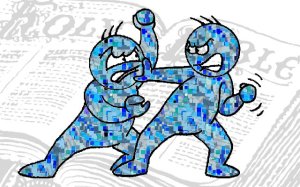 The past few days have highlighted for me once again the degree to which our religious nation is divided.
The past few days have highlighted for me once again the degree to which our religious nation is divided.
 The first example comes from the hugely popular megachurch pastor Rick Warren and his recent reaction when a man slaughtered moviegoers in Aurora, CO. Pastor Warren blamed the violence on those who teach evolution. “When students are taught they are no different from animals, they act like it,” he wrote on his Twitter and Facebook accounts. (He has since deleted his tweet, but not before on-line media such as The Examiner wrote about it.)
The first example comes from the hugely popular megachurch pastor Rick Warren and his recent reaction when a man slaughtered moviegoers in Aurora, CO. Pastor Warren blamed the violence on those who teach evolution. “When students are taught they are no different from animals, they act like it,” he wrote on his Twitter and Facebook accounts. (He has since deleted his tweet, but not before on-line media such as The Examiner wrote about it.)
The second example comes from The Gospel Coalition’s collection of blogs, which featured a post by author and pastor Jared Wilson. In it, Pastor Wilson explains that God’s natural order of things is for men to dominate women, and that rape results from men and women who try to fight that God-ordained hierarchy. (Like Pastor Warren, Pastor Wilson removed the blog post, under protest. Excerpts and an analysis can be found here: “Complementarians and Martial [sic] Sex: The Jared Wilson / Gospel Coalition Saga.”)
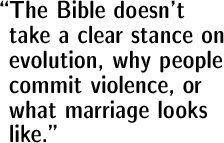 The same Gospel Coalition is promoting an anti-homosexual marriage blog post: Gay Is Not the New Black, written by Pastor Voddie Baucham.
The same Gospel Coalition is promoting an anti-homosexual marriage blog post: Gay Is Not the New Black, written by Pastor Voddie Baucham.
Most of the reactions to these kinds of claims come in one of two varieties: (1) How could anyone possibly agree? or (2) how could anyone possibly disagree?
The naysayers cite their evidence: Pastor Warren has misunderstood the allegorical nature of Genesis, and misunderstood the natural world in that animals don’t tend to slaughter their own kind. Pastor Wilson has ignored passages such as 1 Corinthians 7:3-5 that put men and women on a par in the marriage bed. Pastor Baucham has taken 1 Corinthians 6 out of context while ignoring other relevant passages of Scripture. And so forth.
Then the claimants respond with their own evidence: Morality comes from religion, Colossians 3:18 subordinates women to men, and Leviticus forbids homosexuality.
As a Bible scholar, it’s abundantly obvious to me that both sides find ample support in Scripture. The Bible doesn’t take a clear stance on evolution, why people commit violence, or what marriage looks like — not beyond what we all agree on, at least.
But I don’t think that these are debates about evidence, science, or religion. In fact, I don’t think they are debates at all. They are, rather, collections of diatribes — monologues, as it were, instead of dialogues. And that’s because we tend to focus on our self-selected evidence instead of our motivations.
For example, if Pastors Warren, Wilson, and Baucham discovered that they were wrong about the intent of the Bible (as I believe they often are), would they change their minds? If a new manuscript surfaced, or a better understanding of the text presented itself, would they care? My suspicion is they would not.
Like slavery in its day and usury before that, these issues don’t start with the Bible. They start with how we feel.
So if we’re going to have a real conversation, I think it has to be about our motives, not the texts we choose to support them.
Dawkins, Religion, Morality, and the Importance of Being Informed
In a video interview on Al Jazeera English, the well-known Professor Richard Dawkins is asked why murder is wrong if life isn’t sacred (about 29:45 into the video). “Where do we get the notion of morality,” a caller asks, “from physics or from God?”
It’s an excellent question.
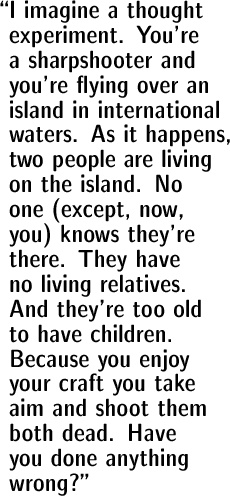 Unfortunately, Dr. Dawkins — usually known for using evidence to support his positions — here essentially reprimands the caller for asking a stupid question: “I cannot believe you’re suggesting” that there could be morality only with God. “Do you seriously think,” he continues mockingly, that people didn’t know that killing was wrong until Moses came down Mt. Sinai with the Ten Commandments and told the people “thou shalt not kill.”
Unfortunately, Dr. Dawkins — usually known for using evidence to support his positions — here essentially reprimands the caller for asking a stupid question: “I cannot believe you’re suggesting” that there could be morality only with God. “Do you seriously think,” he continues mockingly, that people didn’t know that killing was wrong until Moses came down Mt. Sinai with the Ten Commandments and told the people “thou shalt not kill.”
To me (as I said at the very start of my TEDx presentation), this is like saying that of course we don’t need farmers any more because we can get food from supermarkets. I might equally ask Dr. Dawkins, “do you seriously believe that we need people to grow fruits and vegetables when they’re available at any supermarket?”
More specifically, Dr. Dawkins’ response is troubling for three reasons:
- I think he’s misunderstood the role of religion.
- I know he’s misquoted the Bible.
- I think he’s wrong.
The Role of Religion
Dr. Dawkins seems to be missing the essential point. He says that everyone knows murder is wrong, that there are certain evolutionary reasons to come to abhor murder, that it’s better to live in a society where people don’t kill for no reason, and so forth. But even if all of that is true, it’s religion that encodes this important information, and it’s religion that brings the message to people who are trying to decide how to live their lives.
In other words, even if Dr. Dawkins is right that God has nothing to do with morality because some things are immoral simply because they are immoral, it’s still religion that occupies itself with pushing people toward doing what’s right.
The Importance of Being Informed
Ironically, just before the question about morality, Dr. Dawkins stresses that “people who don’t know what they’re talking about should keep quiet,” yet then minutes later he misquotes the Bible to make his point about religion.
It’s well know that the translation “thou shalt not kill” is inaccurate. (I go through all of the evidence in chapter 7 of my And God Said: How Translations Conceal the Bible’s Original Meaning. The short version is that the commandment only applies to illegal killing, and the point is that laws about killing, unlike some other laws, are both matters of law and of morality.) In other circumstances, Dr. Dawkins might be forgiven for relying on a mistranslation, but here he’s trying to speak to the very nature of religion and he’s asserting that he knows what he’s talking about.
The point of the Ten Commandments is that some things are not only illegal but also immoral, and illegal killing is one of those things. (Again, I go into more detail in my TEDx presentation, starting around 15:20 into the video.) So it’s important to distinguish between “kill” and “kill illegally” (“murder” is pretty close, though a little too narrow, because some killing is illegal but not murder).
More generally, Dr. Dawkins seems not to understand the role of religion that he is attacking. He seems to think that, according to the Ten Commandments and religions based on them, the only reason not to murder is that God might catch you and punish you. Some people believe this. But another religion-based approach is that these things are wrong because God doesn’t want us to do them, even if God doesn’t actually punish us.
This is no different than making murder illegal — a step that probably makes sense even though most people wouldn’t murder even if it were legal, and some murderers don’t get caught.
Morality
Perhaps most importantly, I think Dr. Dawkins is wrong.
I imagine a thought experiment. You’re a sharpshooter and you’re flying over an island in international waters. As it happens, two people are living on the island. No one (except, now, you) knows they’re there. They have no living relatives. And they’re too old to have children. Because you enjoy your craft you take aim and shoot them both dead. Have you done anything wrong?
My answer is yes, because it displeases God.
My question is whether Dr. Dawkins thinks it’s wrong, and, if so, why? After all, no one suffers. No one is around to mourn their death, and (because Dr. Dawkins admits no afterlife of any sort) they themselves don’t care that they’re dead. Because the island is in international waters, it’s not even clear that any laws have been broken. In fact, the world may be better off, because you’ve had a fun day, there’s a tiny bit more oxygen left for the rest of us, and you’ve improved your skills, which you can now put to good use.
I suppose Dr. Dawkins would mock me, as he did the caller, for asking, but I’ve been asking this question for 20 years, and I have yet to hear a satisfactory answer other than, “it’s wrong because of some external determination.”
I call that God.
An Open Letter to CNN’s Piers Morgan
[Update: An expanded version of this letter, with additional information about how I read the Bible regarding homosexuality, is available on the Huffington Post. (June 5, 2012)]
Dear Mr. Morgan:
I believe you have been promoting bigotry and helping to perpetrate a fraud.
 During both of your interviews with Pastor Joel Osteen on your CNN broadcast, you let the religious leader tell your audience that Scripture calls homosexuality a sin. But you didn’t ask him where the Bible says that.
During both of your interviews with Pastor Joel Osteen on your CNN broadcast, you let the religious leader tell your audience that Scripture calls homosexuality a sin. But you didn’t ask him where the Bible says that.
It’s both an important point and an easy one to settle. You could have asked Pastor Osteen for the chapter and verse that he thinks calls homosexuality a sin. What you would have found is that he couldn’t provide it, because Pastor Osteen was expressing his personal opinion, not quoting the Bible. The Bible doesn’t say that homosexuality is a sin.
It seems to me that Pastor Osteen, as a religious leader, has a right to believe what he wants and to encourage others to follow. So if he doesn’t accept homosexuality, it’s his prerogative to spread his anti-homosexuality message. But I think it’s dishonest when he pretends that his opinions are those of the Bible.
Similarly, if you don’t like homosexuality, it’s your right to say so on air. But I think it’s irresponsible of you to let a guest tell your audience that something is in the Bible without even asking where.
This glaring omission is all the more surprising in light of your claim to be “challenging.” Why didn’t you challenge Pastor Osteen on this basic factual issue?
I look forward to your response.
Sincerely,
Joel M. Hoffman, PhD
+1.718.834.1080
[email protected]
http://www.Lashon.net
| Copies: | Meghan McPartland, [email protected] |
| Jonathan Wald, [email protected] | |
The Apostle Paul did not Believe in the Historical Adam
A debate has been raging about whether Adam was an historical figure. I think it’s important, because it represents a more general debate about how to live a modern religious life. I also think it highlights a fundamental misunderstanding.
 The historical Adam is apparently important for fundamental Christian theological reasons, which is why Dr. Albert Mohler, Jr., president of the Southern Baptist Theological Seminary, wrote that, “The denial of an historical Adam and Eve as the first parents of all humanity … produces a false grasp of the Gospel” and told NPR that “without [an historical] Adam, the work of Christ makes no sense…”
The historical Adam is apparently important for fundamental Christian theological reasons, which is why Dr. Albert Mohler, Jr., president of the Southern Baptist Theological Seminary, wrote that, “The denial of an historical Adam and Eve as the first parents of all humanity … produces a false grasp of the Gospel” and told NPR that “without [an historical] Adam, the work of Christ makes no sense…”
His basic point, shared by many others, is that, “the Apostle Paul … clearly understood Adam to be a fully historical human.”
It may surprise some that I don’t agree at all. I don’t think that Paul believed in an historical Adam.
I think that the whole notion of “historical” is a modern one, created by modern science, and that it’s this entirely modern approach that pits history against myth. Paul didn’t believe in an historical Adam or a non-historical Adam. He just believed in Adam. It’s only as modern readers that we divide things — for ourselves — into historical and non-historical.
Even ancient historians like Herodotus (5th century BC) and Josephus (1st century AD) freely mixed what we would now call history with literature. As part of their histories, they included verbatim conversations that they had no way of knowing. Similarly, they mixed history with myth, as when Herodotus writes about the phoenix in the same terms as the crocodile or when Josephus, whose life overlapped with Paul’s, describes a cow that gave birth to a lamb during his own lifetime.
So while I understand the modern inclination to ask whether or not the Adam that Paul believed in was historical, I think it’s an anachronistic question. And more than any answer to it, it’s the question itself that parts with Scripture.
[Update: John Farrell has a review on Forbes.com of Peter Enns’ new book, Evolution of Adam: What the Bible Does and Doesn’t Say About Human Origins, including a discussion of some issues surrounding the historical Adam. Also, Dr. Enns just posted a 40-minute lecture in which he talks about the material in his book. (5/14/2012)]
[Update 2: Along similar lines, my father, Rabbi Larry Hoffman, has a piece that I think everyone should read: “Even if every bit of the Bible were literally true, it would still be fiction because…” Read the rest. (5/31/2012)]
[Update 3: Bible Gateway has a series of four videos with four views about the historical Adam: New Videos: Did a Historical Adam Really Exist? (1/22/2014)]
Homosexuality, Hypocrisy, and the Bible
About a year ago I chastized Pastor Joel Osteen and others for what I called “hiding behind Scripture.” In particular, Pastor Osteen had just told CNN’s Piers Morgan that he was locked into his anti-homosexual position by the Bible. He is not, and, I believe, he knows it.
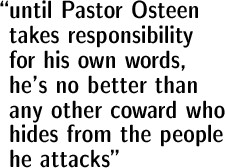 Pastor Osteen just confirmed to Oprah Winfrey that he believes that “homosexuality is shown as a sin in the Scripture,” noting that he encourages people to be “willing to change and grow.”
Pastor Osteen just confirmed to Oprah Winfrey that he believes that “homosexuality is shown as a sin in the Scripture,” noting that he encourages people to be “willing to change and grow.”
On the other hand, when Piers Morgan asked him in October whether he supports the Biblical position of a life for a life, Pastor Osteen admitted (in this video): “I don’t know,” because the death penalty is a “complicated issue.”
In other words, Pastor Osteen doesn’t feel compelled to support everything in Scripture. He openly ignores Exodus 21:24, Leviticus 24:20, and Dueteronomy 19:21. He reserves the right — as we all do — to pick and choose.
This is why I don’t think there’s any merit or integrity to his argument that he is forced to condemn homosexuality because Scripture calls it a sin.
As it happens, I don’t believe that Scripture says that, but I do support Pastor Osteen’s right to interpret Scripture as he chooses.
What I don’t support is the way he presents his opinions as unbiased fact.
As far as I’m concerned, until Pastor Osteen takes responsibility for his own words, he’s no better than any other coward who hides from the people he attacks.



